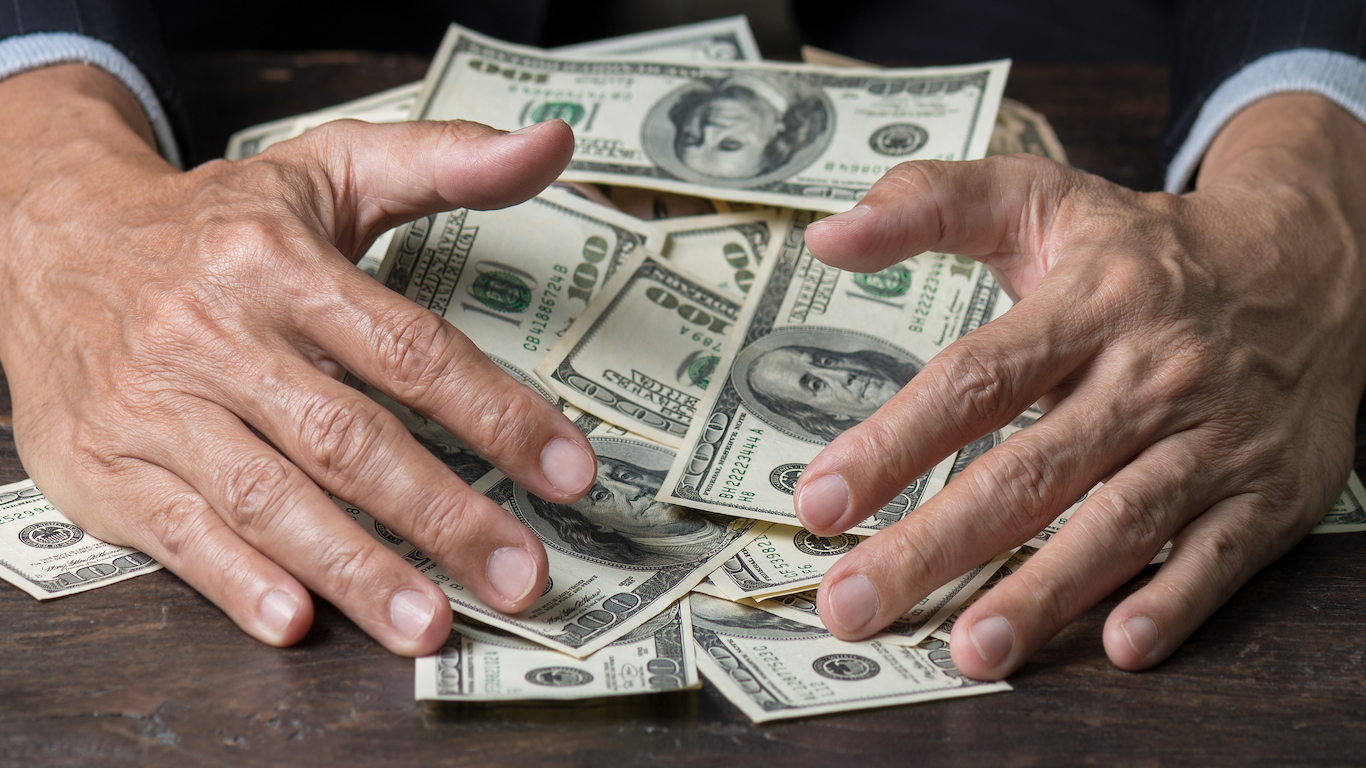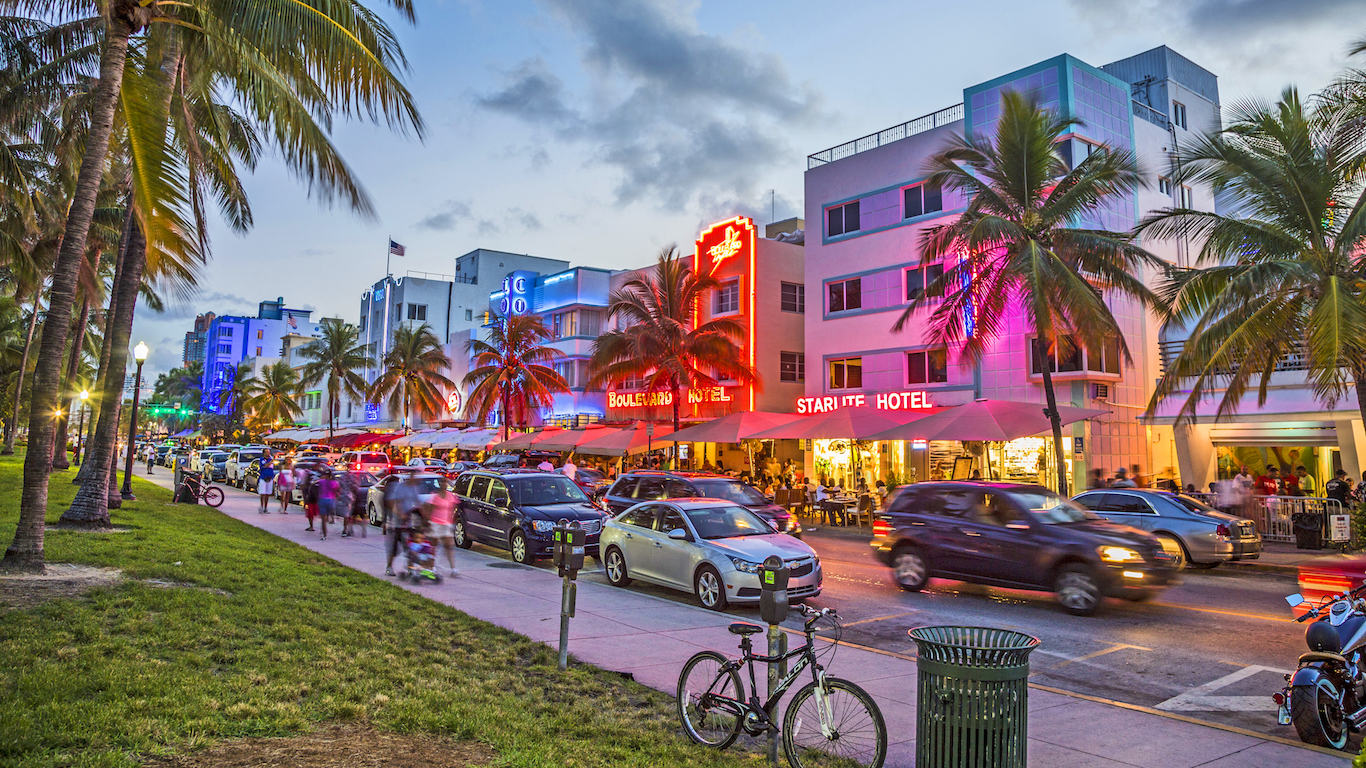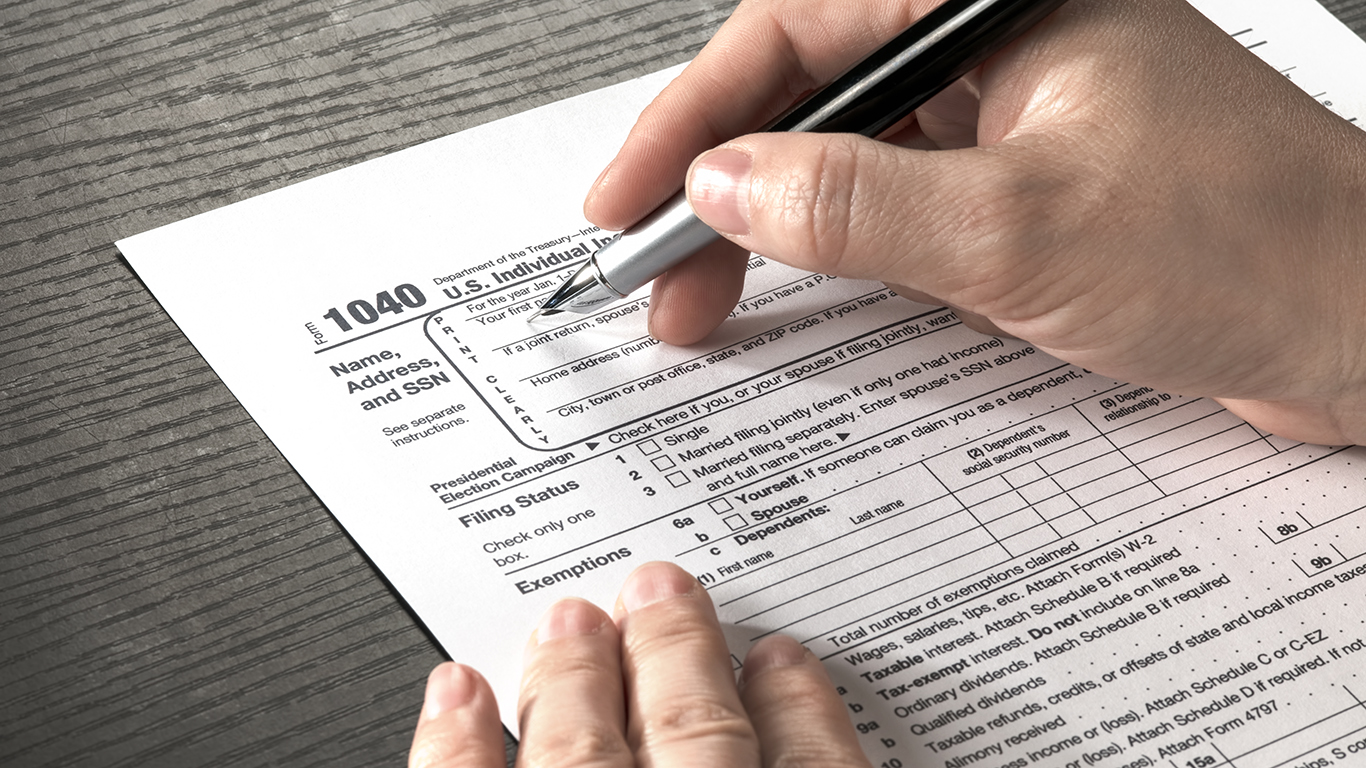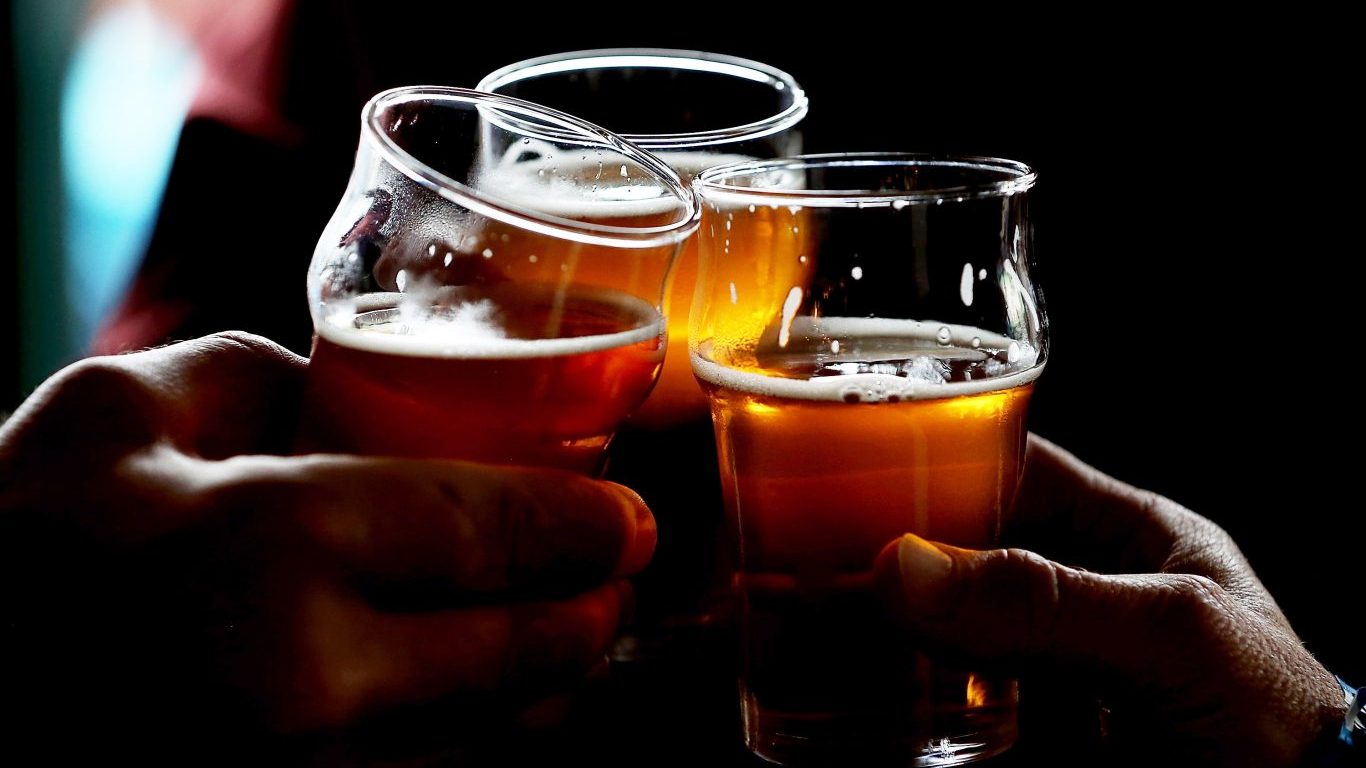
U.S. law allows Americans to engage in certain activities that are known to be risky and unhealthy. Every day, Americans enjoy vices like smoking cigarettes, drinking alcohol, and gambling. Taxes imposed on these activities are commonly known as “sin taxes.”
States collected nearly $60 billion in revenue from such taxes in 2016, the most recent year for which data is available. It is up to each state to regulate gambling activities, like casino gambling, or lotteries. States also control the rate at which alcohol and cigarettes are taxed, leading to wide fluctuations in each state’s revenue from these activities.
To determine the 10 states profiting the most from sin, 24/7 Wall St. reviewed revenue from sin taxes as a percentage of the state’s total tax revenue. Data is from the Census Bureau’s State Government Finances report and the American Gaming Association’s “State of the States” 2017 report.
Residents of states profiting the most from sin are not necessarily shouldering a greater tax burden than most other Americans. Only one state on this list ranks among the top 10 states where Americans pay the most in taxes.
States have differing shares of revenue from sin taxes because of differences in laws and populations. Even if a state has very high tobacco taxes, it may not collect much in cigarette taxes if a small share of residents use tobacco. States can change the excise tax rate on alcohol, tobacco, and more as a way to increase state revenue as well as encouraging residents not to take part in these activities. Different alcoholic drinks, such as liquor and wine, can be taxed differently. Each state has its own tax rate for beer — this how much beer is taxed in your state.
Click here to see the states profiting the most from sin
Click here to read our methodology

10. Tennessee
> Pct. total revenue from sin: 4.0%
> Revenue from sin: $1.3 billion (15th highest)
> Most profitable sin: Lottery
> Lottery proceeds: $609.0 million (14th highest)
Tennessee is one of just 10 states that makes at least 4.0% of its total tax revenue from sin taxes like those on tobacco products, alcohol, or gambling. Sin taxes accounted for nearly $1.3 billion of the state’s $31.4 billion in revenue in 2016.
No state makes a larger share of its revenue from taxes on alcohol than Tennessee. The Volunteer State pulled in 1.08% of its total revenue from beer, wine, and spirits excise taxes. This is due in part to Tennessee’s beer tax, which, at $1.29 per gallon, is the highest of any state. But like many other states, lottery funds are the top sin tax contributor, at nearly $609 million.
See all stories featuring: Tennessee
[in-text-ad]

9. Florida
> Pct. total revenue from sin: 4.1%
> Revenue from sin: $3.5 billion (4th highest)
> Most profitable sin: Lottery
> Lottery proceeds: $1.7 billion (3th highest)
Florida is one of just six states in which at least 80% of residents are 18 or older — meaning a relatively large share of residents can use tobacco, play the lottery, or indulge in other acts that feed into the sin tax. The lottery accounts for nearly half of all sin tax revenue in Florida — about $1.7 billion, which is the third highest total among all states.
Floridians tend not to indulge, or overindulge, in some other behaviors covered by sin taxes. Florida’s adult smoking rate of 15.5% is lower than the U.S. rate of 17.0%. The state also has a lower share of adults who drink excessively at 17.5%, compared to 18.0% of adults nationwide.
See all stories featuring: Florida

8. Pennsylvania
> Pct. total revenue from sin: 4.5%
> Revenue from sin: $4.1 billion (3th highest)
> Most profitable sin: Gaming
> Lottery proceeds: $1.1 billion (6th highest)
Pennsylvania collected nearly $1.4 billion in revenue from direct gaming taxes in 2016 — the most of any state by over $400 million. The state has a dozen casinos operating, and it also permits live horse race betting and off-track betting.
As one of the most populous states in the country, Pennsylvania ranks among the top states in terms of total revenue collected from alcohol, tobacco, and lottery. The state brought in hundreds of millions of dollars from taxes on each in 2016.
See all stories featuring: Pennsylvania

7. South Dakota
> Pct. total revenue from sin: 4.7%
> Revenue from sin: $212.4 million (42th highest)
> Most profitable sin: Lottery
> Lottery proceeds: $115.9 million (31th highest)
As one of the least populous states, South Dakota had the lowest total tax revenue among all 50 states in 2016 at just over $4.5 billion — and 4.7% of that came from sin taxes. Lottery proceeds accounted for more than half of the state’s $212.4 million sin tax revenue, or nearly 2.6% of the state’s total revenue — a higher share than all but three other states.
South Dakota’s population is relatively young. Just 75.5% of residents are 18 years of age or older — a smaller share than all but five other states. A larger adult population would likely drive up sin tax revenue for the state.
See all stories featuring: South Dakota
[in-text-ad-2]

6. Maine
> Pct. total revenue from sin: 5.3%
> Revenue from sin: $475.1 million (36th highest)
> Most profitable sin: Liquor store profits
> Lottery proceeds: $89.1 million (32th highest)
Maine is the only state in which liquor store profits are the largest source of sin taxes. Taxes on these stores provided Maine with $165.4 million in revenue in 2016, dwarfing the lottery tax revenue of $89.1 million. Liquor store taxes amounted to over 1.8% of Maine’s total tax revenue, the highest share of any state.
Maine also collected a relatively high share of its revenue, 1.3%, in taxes on tobacco products. Only three other states collected a larger share of their revenues from tobacco. Maine’s population is one of the oldest in the country, meaning a larger share of residents can legally play the lottery and consume alcohol and tobacco products, contributing to greater sin tax revenue.
See all stories featuring: Maine

5. New Hampshire
> Pct. total revenue from sin: 5.8%
> Revenue from sin: $480.2 million (35th highest)
> Most profitable sin: Tobacco
> Lottery proceeds: $79.4 million (35th highest)
No state collected a greater share of its revenue from tobacco taxes than New Hampshire. Over 2.4% of the state’s $8.3 billion in revenue came from excise taxes on tobacco. For context, the average share among all states is 0.7%, and the second largest share of tobacco tax revenue is 1.6% in Rhode Island.
Liquor is also a major contributor to the New Hampshire’s revenue. New Hampshire has the second highest share of its revenue coming from alcoholic beverage license taxes as well as liquor store profits, at 0.2% and 1.7%, respectively.
See all stories featuring: New Hampshire
[in-text-ad]

4. Delaware
> Pct. total revenue from sin: 6.6%
> Revenue from sin: $531.2 million (31th highest)
> Most profitable sin: Lottery
> Lottery proceeds: $240.7 million (24th highest)
Delaware is one of just four states in which sin taxes make up more than 6% of total revenue. Almost 3%, or over $240 million in 2016, of the state’s total revenue came from lottery proceeds, the third highest share among states. Lottery revenue amounted to more than 45% of sin taxes the state collected that year.
A relatively high share of about 1.2% of Delaware’s revenue comes from tobacco products. Only a handful of other states derive a larger share of their revenue from tobacco.
See all stories featuring: Delaware

3. Nevada
> Pct. total revenue from sin: 6.7%
> Revenue from sin: $1.1 billion (19th highest)
> Most profitable sin: Gaming
> Lottery proceeds: N/A
It should come as no surprise that Nevada, home to Sin City, ranks highly among states profiting the most from sin. Sin taxes provide 6.7% of Nevada’s revenue, one of the highest shares of all states. Of the $1.1 billion in annual revenue Nevada makes in sin taxes, more than $900 million come from gaming. Nevada has over 300 casinos.
Nevada ranks only third in terms of total tax revenue gained from gaming, behind the more populous states of Pennsylvania and New York. The state has the 19th highest total revenue from sin taxes at $1.1 billion, despite having the 33rd largest population among states. Nevada is one of just a handful of states that has no state-run lottery.
See all stories featuring: Nevada

2. West Virginia
> Pct. total revenue from sin: 6.9%
> Revenue from sin: $953.1 million (21th highest)
> Most profitable sin: Lottery
> Lottery proceeds: $501.6 million (17th highest)
West Virginia gets more than 3.6% of its total revenue from lottery proceeds — more than triple the 1.1% average among states. The state pulled in more than half a billion dollars from the lottery in 2016, making up more than half of the revenue it collected from all sin taxes.
West Virginia collects about 0.6% of its revenue from taxes on tobacco products, below the 0.7% national average. This is somewhat surprising considering the state has the highest adult smoking rate, at 24.8%. West Virginia, however, has lower state cigarette excise taxes than most other states.
See all stories featuring: West Virginia
[in-text-ad-2]

1. Rhode Island
> Pct. total revenue from sin: 10.4%
> Revenue from sin: $856.3 million (25th highest)
> Most profitable sin: Lottery
> Lottery proceeds: $369.4 million (19th highest)
At 10.4%, Rhode Island derives by far the largest share of its revenue from sin taxes, several percentage points above the next closest state. Despite having barely over 1 million residents, Rhode Island pulled in over $856 million from sin taxes in 2016.
Like many other states, Rhode Island’s biggest sin tax contributor to its revenue is the lottery. The state made over $369 million in lottery proceeds in 2016, accounting for 4.5% of the state’s total revenue that year — the highest share of any state by far. Nearly 1.6% of the state’s 2016 revenue came from taxes on tobacco products, more than double the 0.7% average among states. This may be due in part to the fact that Rhode Island’s cigarette excise tax rate of 4.3% is one of the highest of all states.
See all stories featuring: Rhode Island
Methodology
To identify the states profiting the most from sin, 24/7 Wall St. reviewed state tobacco taxes, alcohol taxes, casino taxes, as well as proceeds from state-controlled liquor stores and state lotteries. States were ranked by sin taxes as a percentage of the state’s total tax revenue. Tobacco, alcohol, liquor store, lottery income, and total tax revenue came from the Census Bureau’s State Government Finances report. Casino taxes came from the American Gaming Association’s “State of the States” 2017 report, which includes 2016 data. All other figures are for fiscal year 2016, the most recent year for which all data in the index was available. 24/7 Wall St. also reviewed excise tax rates as of Jan. 1, 2019 from the Tax Foundation. We also reviewed alcohol consumption data and adult smoking rates from the Centers for Disease Control and Prevention.
100 Million Americans Are Missing This Crucial Retirement Tool
The thought of burdening your family with a financial disaster is most Americans’ nightmare. However, recent studies show that over 100 million Americans still don’t have proper life insurance in the event they pass away.
Life insurance can bring peace of mind – ensuring your loved ones are safeguarded against unforeseen expenses and debts. With premiums often lower than expected and a variety of plans tailored to different life stages and health conditions, securing a policy is more accessible than ever.
A quick, no-obligation quote can provide valuable insight into what’s available and what might best suit your family’s needs. Life insurance is a simple step you can take today to help secure peace of mind for your loved ones tomorrow.
Click here to learn how to get a quote in just a few minutes.
Thank you for reading! Have some feedback for us?
Contact the 24/7 Wall St. editorial team.
 24/7 Wall St.
24/7 Wall St. 24/7 Wall St.
24/7 Wall St.


